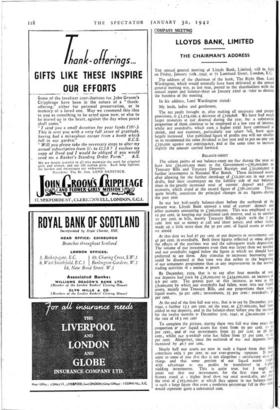LLOYDS BANK, LIMITED
THE CHAIRMAN'S ADDRESS
THE annual general meeting of Lloyds Bank, Limited, will be held on Friday, January 3oth .1942, at 71 Lombard Street, London, E.C.
The address of the chairman of the bank, The Right Hon. Lord Wardington, which would normally have been delivered at the annual general meeting was, as last year, posted to the shareholders with the annual report and balance-sheet on January 22nd in -rder to shorten the business of the meeting.
In his address, Lord Wardington stated: My lords, ladies. and gentlemen, The net profit brought in, after making all necessary and proper provisions, is £1,274,199, a decrease of £109,608. We have had much larger resources at our disposal during the yea'. bur a substantial proportion of them continue to be employed at a low rate of interest, whilst our overdrafts, which earn. a higher yield. have continued to shrink, and our expenses, particularly our salary bill, have again largely increased Our published figure of profits you will see enables us to recommend the same dividend as last year and to put on one side £350,000 against any contingency, and at the same time to increase slightly the amount carried forward.
BALANCE-SHEET
have lent £95,060,000 more to the Government—£65,000,000 on The salient points of our balance-sheet are that during the year we
Treasury Bills and Treasury Deposit Receipt and £30,000,000 in further investments in National War Bonds. These increased assets, after allowing for the further shrinkage of £12,000 joo in our over- drafts, find their counterpart on the liability side of our balance- sheet in the greatly increased total of current deposit and other accounts, which stand at the record figure of £581,00°,000 These. quite briefly, constitute the principal changes in oil figures. during the past year.
In our last half-yearly balance-sheet before the outbreak of the present war, Lloyds Bank showed a total of curren. deposit and other accounts amounting to £396,000,000. This was employed as to to per cent. in keeping our traditional cash reserve, and as to another to per cent. in bills, mainly Treasury Bills, which with the 7 per cent lent out as money at call and short notice, and other items, made up a little more than the 3o per cent. of liquid assets at which we aimed.
At that date we had 27 per cent. of our deposits in investments and 42 per cent, in overdrafts. Both these figures reflected in some degree the effects of the previous war and the subsequent trade depression. The volume of our investments even then was larger than we needed. and our overdrafts lagged below the figure at which we should have preferred to see them. Any stimulus to increased borrowing that could be discerned at that time was due rather to the beginning of our armament programme than to any improvement in the normal trading activities of a nation at peace.
By December, 1939, that is to say after four months of wat, our deposits had risen by £38,000,000 to £434,000,000. an increase of 9.6 per cent. The greater part of this increase, as west as the £6,000,000 by which our overdrafts had fallen, went into our liquid assets, mainly into Treasury Bills, and our proportions then were, liquid assets, 39 per cent.; Investments, 25 per cent.: overdrafts. 37 a per cent.
At the end of the first full war year, that is to say by December 31st, 1940, a further 13.1 per cent. on the year, or £57.000,000, had been added to our deposits, and in the balance-sheet before you the increase for the twelve months to December 31st, 1941. of £90.000,000 is at the rate of 18 3 ner cent To complete the picture, during these two full war time years the _proportion o' our liquid assets has risen from 39 per cent. to 50 per cent., and of our investments from 25 per cent. to 28 Per cent., -whilst our o..erdraft ratio has fallen from 37 per cent. to 22 per cent. Altogether, since the outbreak of wa• our deposits have increased by 46.7 per cem.
Nearly half our assets are now in such a liquid form that the! contribute only x per cent, to our ever-growing expenses. It ma! seem to some of you that this is not altogether a satisfactory state or things and that some portion of our liquid assets might with advantage to our profits be transferred to h.ghe yielding investments. This is quite true, but I ought t° point out that our investments for the first time in our history stand at higher level than our total overdrafts, and dui the total of £163,000,o0c- at which they appear in our balance-she is such a large figure that even a moderate percentage fall in this value would represent quite a substantial sum.


























 Previous page
Previous page